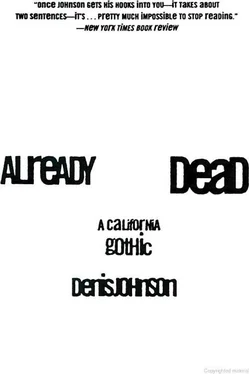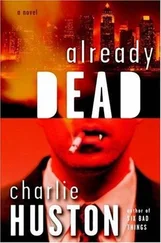I wasn’t about to wake him. Maybe he needed his sleep. Anyway just getting to his room had licked me. I was beat, might as well have swum up here through blood. I poured my glass full and raised the window just a handsbreadth and inhaled. Without the fog to dilute it, the sunshine put everything on a slow bake, but this near the shore the air felt cool and smelled of voyages. Faint thunder drifted up this way, the flailings and snoring of the Pacific. It came through the window and woke my father.
He opened his eyes. He spoke immediately: “Let’s make every little thing illegal, and put all of ourselves in prison.”
“Hey, dig it, why not?”
“I’d like to get the sombitches”—he pushed himself up on his elbows, forgetting his automatic bed—“I’d like to get the sombitches Already Dead / 119
down under my boot for just ten minutes, and then I’d stomp an explanation out of their sorry faces. Just why is it that a motel, a good aesthetic-looking structure designed by any hippie or any faggot, they can choose whoever they want, cannot rest by the edge of the cliff, a badly needed motel? When rooms are up around two hundred dollars a night on this coast? So the sea can remain beautiful, they say. Beautiful with bars across it. Beautiful if you can pay two hundred dollars a night and wait a month for the reservation. Don’t they realize where beauty is? Do you happen to realize where yourself?”
“I think you want me to say beauty is in the bank. In the faces on the money.”
That shut him up. He wrote me off. I could see it in his eyes. But if I’d had to I could have seen it in his ears or hands or hair. I could have looked at one fingernail and told you I’d once again squirted away my chance to be his son. He always gave me a chance and then always, within minutes, saw me fail. I was used to the process. It gave me a sick thrill, if you want me to be frank.
Part of his silence owed to his disease, whatever it was. He woke with a bang but petered out fast. He wouldn’t say what disease he had.
The doctors knew, and they’d told him. But he felt they lied just for fun, if for no better reason — projecting his own relentless untruthfulness onto others. His dishonesty wasn’t weakness: it shaped his faith, helped constitute his creed. He believed strongly in the efficacy of lying. He valued falsehood as a tool. The truth he feared as uncontrollable once you let it out. But he knew the difference between the two.
“Well, it’s Higgins and Tom Aiken”—two environmentalist lawyers—“my personal Rawhead and Bloodybones. If half their rat-shit buddies weren’t on the Coastal Commission I could subdivide down to square meters and build clear up into the clouds. They figure to stall.
Get the game called for darkness. They think I’ll roll over dead. Not hardly! Hand me that phone.”
“It’s damn near six P.M., Dad.” I always get western in his presence.
“Dial me a number.”
I put the receiver into his tiny clawing grasp and punched the buttons he wanted. “Give me a minute, please,” he said, covering the mouth-piece.
Banished inside of sixty seconds? I may have achieved some record there. I left him to his shenanigans and went down the hall to the 120 / Denis Johnson
toilet. The one-man barbaric horde, he’s in yet another war. Everybody knows he’s a crook. Big deal! Who cares? My father not only knows the difference between right and wrong, but he’s also willing to live with it, and let others draw their own conclusions about him. Not me.
Not me — I’m the Mole Person, hiding from the truth in any hole, here, for instance, in my father’s upstairs bathroom, on the shady side of the house, half-dark and quiet and cool as its tiles. A small chamber, but with me in here it holds magnificent structures of natural growths, the big fat systemic organism of my deceits. Maneuvering through my lies was like hopping faster than the eye could follow from branch to branch across the roof of a jungle, a jungle cultivated to cover up earlier lies, the whole business lacing back delicately to find its mother-root in my first lie, completely forgotten now, and never to be discovered by anybody else, the lie to cover my first little crime, also forgotten — no, I swear I didn’t take the cookies — or, more probably, a whole childhood fashioned to avoid the question of the cookies in the first place, my every move, to this day, warped around the absence of getting caught, the void where there should have been my arrest and trial and punishment: a new route to school planned in order to avoid the boy who owned the stolen cookies, and a reason invented to explain the new route to whoever might ask, and evidence concocted to demonstrate that the reason isn’t a lie — I need the exercise, I’m going out for track and field — and then a career of track-and-field events and long practice in a sport that doesn’t interest me, and a new personality shaped, a false persona who thrives on track and field, who loves running (But I do love running. Don’t I? Or else why spend so much time doing it?) and hurdling over the intricacies of his falsehoods toward this day, Tuesday, September 4, when I’m ready to commit murder to deal with my mistakes without actually correcting them because…because I don’t want to correct them. I can’t survive the correcting of them. I just want them erased.
My father would never have understood these things. Even now, if he’d found himself in my place, he’d have crawled out of bed and somehow gotten, he and his sawed-down Winchester shotgun, up the hill above Anchor Bay to put a third eye in Harry Lally’s forehead.
He called from his sickbed, “Somebody hang this thing up! Hang this sombitch up for me, damnit!”
Already Dead / 121
Donna was standing at the turn of the stairs as I headed toward his room. “Yes?” she said. “Yes?”
“Tell her to get lost,” he said as I entered. Donna must have heard this, because she didn’t appear. I put the phone on the table for him, and he said, “I’d hate for them to win the last goddamn battle.” I pulled up a chair and unfolded the paper, the Barron’s .
He said, “Didn’t it come yesterday?”
“I don’t know when it came. I picked it up today.”
“You know how you talk to me, you little pissant? Like all the other little pissants on earth now. Like I’m old and fizzled out in the brain.”
“I don’t think you’re fizzled in the brain.”
“You repeat my words, like these are the key words…It’s hard to explain. Read.”
While he rested and caught his breath, I read out loud about this and that, the conclusions to be drawn from certain upswings and the stance most profitable given the tenor of the times (all of it obviated by the week’s events in Kuwait, and nothing that would help my kind of money trouble certainly), glancing up once in a while at my sick father with his zero face. His eyes were open, but I don’t know if he was listening to this stuff any better than I was.
“How’s Winona?”
“I haven’t seen her. We’ve talked on the phone. She got back.”
“Why hasn’t she stopped by to see me?”
“Because she doesn’t like to see you like this. It nauseates everybody as a matter of fact.”
“Did she file the divorce?”
“She did. I don’t have the money to fight it.”
“I’ve written her a letter.”
“Concerning what?”
“I’m yanking her up and kicking her legs out from under.”
“What do you mean?”
“I’ve straightened her mind out on a few things, is all. She’ll see what it means to discount me. And you, meanwhile, you’ve been seen drunk in public with that gypsy runt.”
“I have?”
“Your hedge-whore.”
Читать дальше












